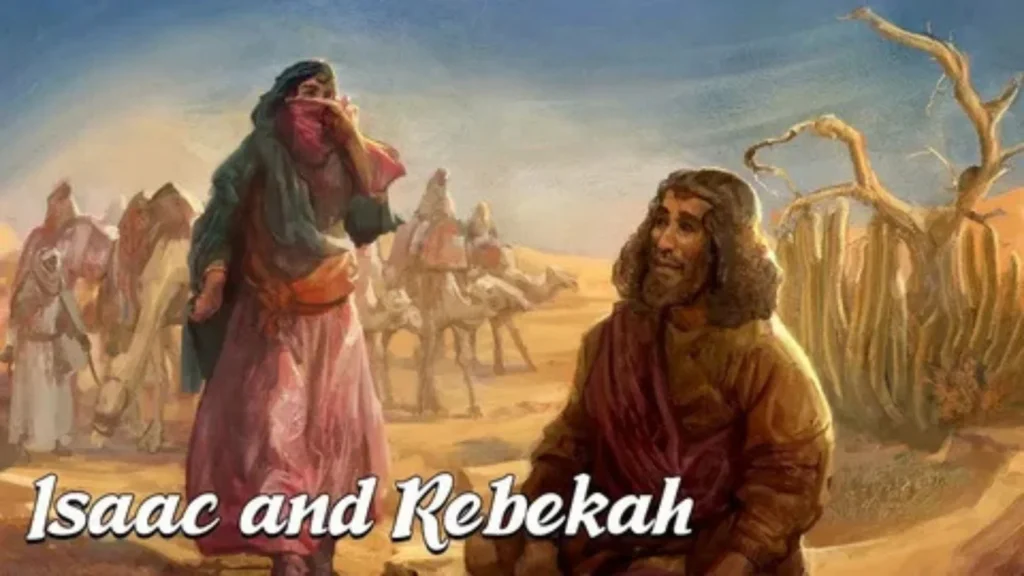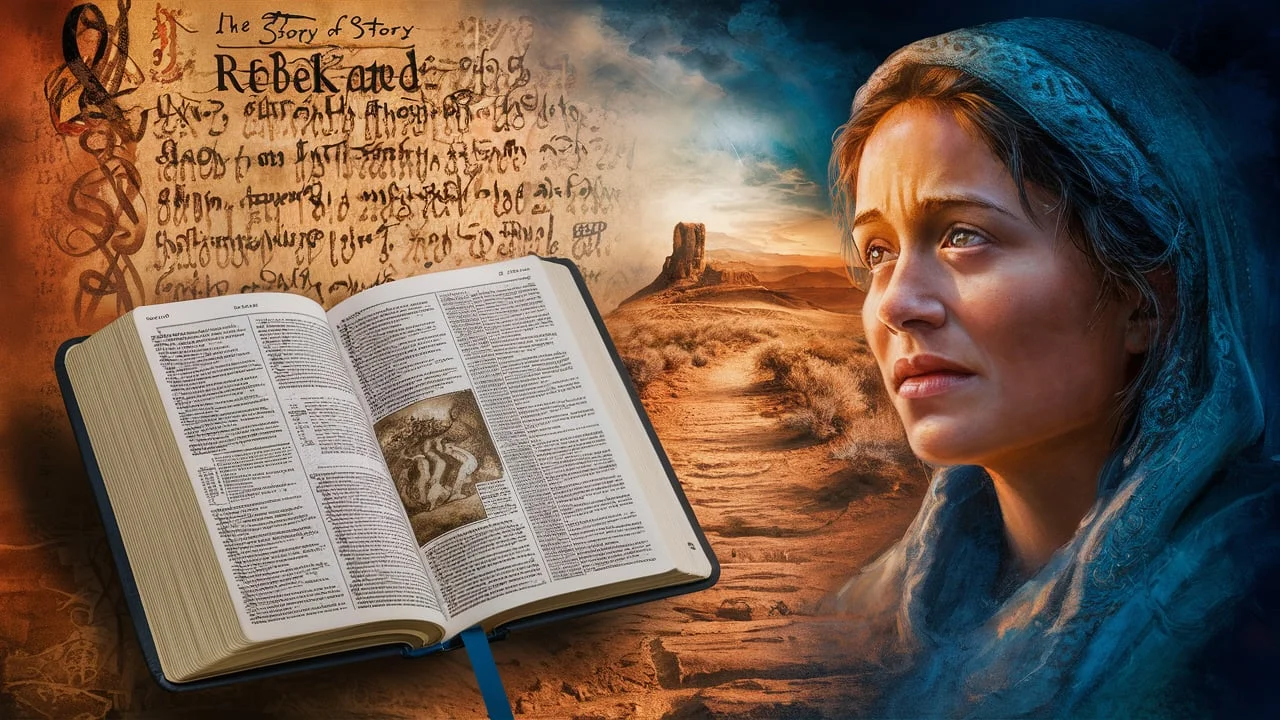Last Updated on October 27, 2024 by Ethan Richards
In the tapestry of biblical narratives, Rebekah’s story shines as a beautiful portrayal of love, faith, and destiny.
Discover the profound character of Rebekah, a story woven with divine purpose and unwavering faith. Through her courage and devotion, Rebekah’s journey inspires us to embrace love, trust in God’s plan, and find strength in service. Dive into Rebekah’s story to see how her life offers a timeless example of faith-filled love and spiritual legacy.
As one of the matriarchs of the Hebrew Bible, Rebekah’s journey is far from ordinary. From her first encounter with Isaac, her husband, to her role in shaping the lineage of Israel, Rebekah exemplifies courage, kindness, and deep faith in divine guidance.
Rebekah in the Bible

Rebekah, a prominent figure in the Old Testament, is introduced as the wife of Isaac and the mother of Esau and Jacob. Her story unfolds in the Book of Genesis, where she plays a crucial role in the Abrahamic lineage.
Rebekah’s narrative highlights themes of divine providence and the fulfillment of God’s promises.
Key Events:
- The Servant’s Journey: Rebekah enters the biblical scene when Abraham’s servant travels to Mesopotamia to find a wife for Isaac. Guided by divine intervention, the servant meets Rebekah at a well, where her kindness and willingness to draw water for him and his camels fulfill the servant’s criteria.
- Marriage to Isaac: Rebekah’s willingness to leave her family and travel to Canaan demonstrates her faith and obedience. Her marriage to Isaac is celebrated as a union of divine purpose, continuing the covenant made with Abraham.
Rebekah’s Marriage to Isaac
Rebekah’s marriage to Isaac is a pivotal moment in biblical history. This union is not just a personal relationship but a significant element in the unfolding of God’s plan for the Abrahamic covenant.
Symbolism in Their Marriage:
- Divine Choice: The circumstances of their meeting and marriage are depicted as orchestrated by God, symbolizing divine guidance and purpose.
- Faith and Obedience: Rebekah’s willingness to leave her homeland reflects her faith in God’s plan and her role in fulfilling the promise made to Abraham.
Motherhood and Family Ties
Rebekah’s role as a mother and her interactions within her family significantly impact the biblical narrative.
Children:
- Esau and Jacob: Rebekah gives birth to twins, Esau and Jacob. The dynamic between her sons is crucial, as it sets the stage for future conflicts and the fulfillment of God’s prophecy regarding the elder serving the younger.
Family Dynamics:
- Favoritism: Rebekah favors Jacob over Esau, a choice that influences the family’s future. Her intervention in securing Isaac’s blessing for Jacob highlights the complexities of familial relationships and divine will.
- Prophetic Significance: Rebekah’s actions align with the prophecy that Jacob, not Esau, will inherit the blessing, demonstrating how personal choices intersect with divine plans.
Rebekah’s Interaction with God’s Plan
Rebekah’s life and actions illustrate her role in the broader narrative of God’s plan for His people.
Divine Guidance:
- Revelation at the Well: Rebekah’s encounter with Abraham’s servant is depicted as a divinely guided event, illustrating God’s active role in orchestrating significant life events.
- Fulfillment of Prophecy: Her role in ensuring Jacob receives Isaac’s blessing fulfills the prophecy given to her during her pregnancy, showcasing the interplay between human decisions and divine intentions.
Lessons from Rebekah’s Life

Rebekah’s life offers valuable lessons about faith, family, and divine purpose.
Moral and Ethical Lessons:
- Obedience: Rebekah’s obedience to God’s plan, despite personal sacrifices, serves as a model of faithfulness.
- Resourcefulness: Her ability to navigate complex family dynamics and secure a blessing for Jacob highlights the importance of wisdom and strategic thinking.
Practical Applications:
- Family Relations: Rebekah’s story underscores the impact of favoritism and the importance of balanced family relationships.
- Faith in Action: Her life encourages individuals to trust in divine guidance and act with integrity, even when faced with challenging circumstances.
Legacy and Significance
Rebekah’s legacy extends beyond her biblical narrative, influencing various religious and cultural contexts.
Historical Impact:
- Religious Traditions: Rebekah is a revered figure in Judaism, Christianity, and Islam, each interpreting her role through their respective theological lenses.
- Cultural Influence: Her story has inspired countless works of art, literature, and religious teachings, highlighting her enduring impact on cultural and spiritual traditions.
Cultural Legacy:
- Art and Literature: Rebekah’s story has been depicted in various artistic forms, reflecting her significance in cultural and religious history.
- Popular Culture: Her name and narrative continue to resonate in modern contexts, symbolizing faith, resilience, and divine purpose.
Spiritual Meaning of the Name Rebekah
The name Rebekah carries profound spiritual significance, rooted in its etymological origins.
Etymology:
- Origin and Meaning: The name Rebekah (or Rebecca) is derived from the Hebrew name “Rivkah,” which means “to bind” or “to tie.” This reflects themes of connection and commitment in biblical narratives.
- Translation: In the context of the Bible, the name symbolizes a strong and binding relationship, aligning with Rebekah’s role in God’s covenant.
Symbolic Significance:
- Connection to Divine Plan: The name’s meaning underscores Rebekah’s role in fulfilling God’s promises and maintaining the divine lineage.
- Spiritual Themes: Rebekah’s story and name evoke themes of faith, destiny, and divine purpose, offering spiritual insights into her character and actions.
Numerological Meaning of the Name Rebekah
Numerology provides additional layers of meaning to the name Rebekah.
Numerological Analysis:
- Number 2: In numerology, the name Rebekah corresponds to the number 2, which represents balance, harmony, and partnership. This aligns with her role as a wife and mother in the biblical narrative.
- Symbolic Interpretation: The number 2 signifies duality and relationship, reflecting Rebekah’s role in the family and her involvement in divine plans.
Popularity of the Name Rebekah
The name Rebekah has seen varying levels of popularity throughout history.
Historical Trends:
- Ancient Times: Rebekah was a common name in ancient Hebrew culture, reflecting its biblical roots.
- Medieval and Renaissance Periods: The name experienced fluctuations in popularity, often influenced by religious and cultural trends.
Current Trends:
- Modern Popularity: In recent decades, Rebekah has seen a resurgence in popularity, influenced by its timeless appeal and historical significance.
- Popularity Rankings: The name consistently ranks in the top 500 names for girls in various English-speaking countries.
Variations and Nicknames
Rebekah has several variations and nicknames that reflect its diverse cultural contexts.
Common Variations:
- Rebecca: A widely used variation, often interchangeable with Rebekah.
- Rivkah: The original Hebrew form of the name.
Familiar Nicknames:
- Becky: A popular and affectionate nickname.
- Reba: A shorter, more informal version of Rebekah.
Ideal Sibling Names for Rebekah
Choosing sibling names that complement Rebekah can create a harmonious naming theme.
Name Pairings:
- For Boys: Names like Nathaniel, Daniel, or Benjamin complement Rebekah well, maintaining a classic and timeless feel.
- For Girls: Names such as Elizabeth, Hannah, or Sarah pair beautifully with Rebekah, reflecting traditional and biblical roots.
Considerations:
- Harmony: Opt for names that match the classic and meaningful nature of Rebekah.
- Cultural Significance: Consider names with shared cultural or religious significance for a cohesive family theme.
Famous People Named Rebekah

Several notable individuals share the name Rebekah, spanning various fields and historical periods.
Historical Figures:
- Rebekah of the Bible: The original bearer of the name, whose story has influenced religious traditions.
Contemporary Figures:
- Rebekah Brooks: A prominent British journalist and former chief executive of News International.
- Rebekah Vardy: A well-known British media personality and reality TV star.
Is Rebekah a Good Name for a Baby Girl?
Choosing a name for a baby is a deeply personal decision. Rebekah offers a blend of historical significance, spiritual meaning, and cultural relevance.
Pros:
- Historical and Religious Significance: The name carries rich biblical and cultural roots, making it a meaningful choice.
- Timeless Appeal: Rebekah has a classic charm that remains relevant across generations.
Cons:
- Popularity Trends: While it enjoys timeless appeal, some might prefer more modern names.
Final Thoughts:
Rebekah stands out as a name imbued with historical depth and spiritual significance. Its enduring popularity and meaningful origins make it a strong choice for a baby girl, reflecting a legacy of faith, family, and divine purpose.
FAQs
Who is Rebekah in the Bible, and why is she significant?
Rebekah is a prominent figure known for her strong faith, courage, and role in fulfilling God’s divine plan, making her an inspiring example for believers.
What role did faith play in Rebekah’s story?
Faith was central to Rebekah’s journey, guiding her decisions, from leaving her family to marry Isaac to supporting God’s covenant through her children.
How does Rebekah’s love story with Isaac reflect God’s purpose?
Their union symbolizes trust in God’s guidance, showing how He orchestrates events to fulfill promises and divine purposes.
What lessons can we learn from Rebekah’s character?
Rebekah’s story teaches us about faithfulness, hospitality, and the strength to follow God’s plan, even in the unknown.
Why is Rebekah’s legacy important today?
Rebekah’s legacy as a matriarch in faith continues to inspire people to live with love, purpose, and trust in God’s promises.
Conclusion
Rebekah’s story and the meaning of her name offer profound insights into biblical history and cultural significance. Her role as a matriarch, her interactions with divine plans, and the enduring legacy of her name underscore her importance in religious traditions and popular culture. Whether considering Rebekah for a baby girl or exploring her historical impact, her narrative continues to inspire and resonate across generations.

Matthew Porter combines his passion for theology with an extensive study of dreams. His analytical approach and eloquent writing style make complex interpretations accessible, helping readers uncover the hidden messages in their dreams and connect with their spiritual path.










